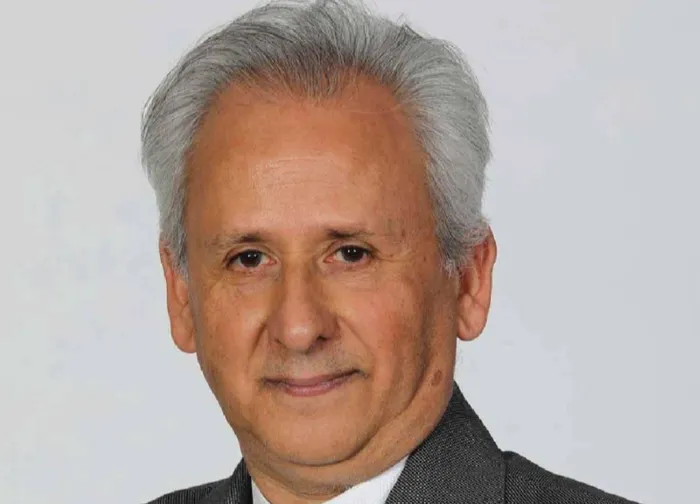Hopes for acting police minister to tackle SA's crime scourge
Champion of Constitutionalism

Firoz Cachalia
Image: Facebook
PRESIDENT Cyril Ramaphosa has appointed veteran activist Professor Firoz Cachalia as the acting police minister after the current minister, Senzo Mchunu, was placed on a special leave.
He made the announcement in the wake of serious allegations by KwaZulu-Natal (KZN) Police Commissioner, Lieutenant-General Nhlanhla Mkhwanazi, that Mchunu had colluded with criminal cartel leaders.
Last Sunday, Mkhwanazi, shocked the country during a media briefing in which he made a wide range of allegations, including that Mchunu and other high-ranking police officers were involved in aiding and abetting criminals.
On Sunday, Ramaphosa announced a Commission of Inquiry would look into the allegations and provide an interim report within three months.
The inquiry would be headed by acting deputy Chief Justice Mbuyiseli Madlanga.
Mkhwanazi alleged that Mchunu interfered with sensitive police investigations and colluded with business people, including a murder accused, to disband the Political Killings Task Team based in KZN.
He also alleged that an investigation by the task team in Gauteng unmasked a syndicate controlled by a drug cartel, which involved politicians, law enforcement officials from the SAPS, metro police and correctional services; prosecutors and the judiciary, as well as business people.
Mchunu has been placed on a leave of absence with immediate effect. Cachalia would take up the position on August 1, when he retires as a professor of law at the University of the Witwatersrand.
Reaction
Neeshan Balton, executive director of the Ahmed Kathrada Foundation, said he thought the president's decision to appoint Cachalia was “brave and good”.
“Professor Cachalia comes from a background of activism. He is a lawyer and academic, but also a champion of constitutionalism in South Africa. He was part of the drafting and implementation of the Constitution.
“It is also known that a minister sets the policy direction and has to ensure there is proper oversight of the usage of all resources. I believe if he gets all of that right, then he will shift the South African Police Service, together with the support of the people of South Africa to tackle the crime scourge in the country,” he said.
David Bruce, a policing research consultant to the Institute of Security Studies (ISS), said the appointment of a Commission of Inquiry was promising.
“The allegations need to be thoroughly investigated by a body that is seen to be impartial. These commissions can be helpful in assisting the public to understand the facts of a situation.
“In addition, the allegations speak to concerns in South Africa about the relationship between politics, criminal justice, organised crime and corruption; and this is an opportunity to examine these issues in detail. It is important that the Commission be given all the necessary support,” he said.
Bruce added that at the same time investigations into political killings and the killings of whistle-blowers should not be adversely affected.
“It is critically important that the new police minister ensures through a transparent process that everything necessary is being done to ensure that these criminal cases continue to be vigorously and thoroughly investigated.”
Shenilla Mohamed, the executive director of Amnesty International South Africa, said: “We reiterate our call for these claims to be addressed with the severity and urgency required. Anything less is a blatant disregard for ensuring the protection of everyone’s rights to safety and life in South Africa. This cannot be just another inquiry that leads to no justice or accountability.”
She said in addition, taking into consideration the nature of the allegations and evidence uncovered, the commission would have the power to refer matters for immediate criminal investigations and prosecutions.
“The commission itself, however, is not a criminal proceeding and action will need to be taken by law enforcement agencies to ensure accountability.”
Mohamed added South Africans were tired of costly commissions that were long drawn out and led to no accountability.
“The mere fact that another commission is being established is an indictment of our justice system and state institutions. We need to see concrete and enforceable action to fight crime and not more processes that delay justice. President Ramaphosa has an opportunity, and the power, to tackle corruption within the state quickly and decisively. Failure to do so has a massive impact on the rights of the people who live in South Africa.”
In a statement, Corruption Watch (CW), said it was disappointed that Ramaphosa had taken so long to announce the Commission of Inquiry .
“As far back as 2019, CW and the ISS, in their joint submission to the Judicial Commission of Inquiry into allegations of State Capture (Zondo Commission), highlighted how organised crime had flourished during the years of state capture, and the extent to which criminal justice agencies were manipulated for political and personal gain.
“Subsequently, former Chief Justice Raymond Zondo recommended in his final Zondo report in 2022 that evidence submitted to the commission about alleged corruption in law enforcement entities, which was too broad to be addressed by the commission, be used in ongoing investigations to pursue these allegations and prevent further erosion of these institutions.
“Three years on, and the country has seen what happens when such critical crime-fighting institutions have been left to unravel, as a result of indecisive leadership and a failure to address internal tensions and allegations of corruption and criminality,” it read.
“It is vital that investigators appointed by the commission are immediately empowered to investigate and that bodies like the National Prosecuting Authority are sufficiently capacitated and agile to take these criminal investigations forward. It is hoped that the process of this commission will not be hindered or derailed by delays or interference, and that there is decisive action to hold those found guilty to account.”
The CW welcomed Cachalia’s appointment.